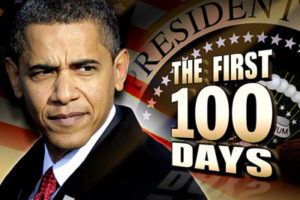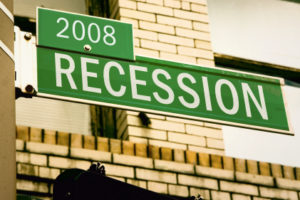On January 20, 2010, Senator Barack Hussein Obama made history when he was sworn in as the 44th President of the United States and the country’s first African-American President. One-year later, he is struggling to hold his party together, overcome a lagging recession, and deal with a domestic agenda that is log jammed in Congress. Obama rode into Washington on a wave of hope, optimism, and change, but he has squandered much of his political capital on trying to reform healthcare and unpopular decisions on wars overseas and bailouts in Detroit and on Wall Street. The man that was once made famous from his encouraging words of “yes we can” … now may be thinking – “yes we could”.
Candidate Obama excited the electorate with his articulate and eloquent words that called for “change” in Washington. Mr. Obama promised to bring forth reforms in healthcare, labor, energy, foreign relations, and even treatment of terrorists. Fast forward to today and most of those promises are hung up in the sausage making of Congress. Obama has focused most of the last year on an unpopular health bill, which has placed him on the opposing side of most voters. Support for the healthcare plan is very low, at 35% it is as low as Bush’s approval ratings in 2008. Healthcare reform is near the finish line, but a race in Massachusetts yesterday may have delayed or killed the bill.
Republican Scott Brown defeated Democrat Martha Coakley for the seat left vacant by the late Senator Ted Kennedy. Normally, this race would have been a “gimme” for Coakly, but voters in Massachusetts had another idea in mind. The outcome of the special election would mean nothing in most years, but in a year where a partisan healthcare reform bill requires every vote, Coakley’s defeat has the potential to seriously threaten not only healthcare reform, but the entire liberal agenda that Obama is pushing.
America is outraged by the political games that Democrats are playing in Washington and the governor races last year in Virginia and New Jersey, and the special election in Massachusetts are just previews to what we will see in races across the country in 2010. One important note is that Brown is pulled 75% of Independents in Massachusetts and the voter turnout was exceptionally heavy, which both have to be increasingly worrisome facts for incumbents that are on the proverbial chopping block in 2010.
Obama has not proved to be much help to his Democratic colleagues. After campaigning on behalf of candidates in all three races, polls show that when Obama is not on the ballot, his base stays home. If Democrats cannot be saved from “touching the hymn of his garment”, then they will think twice before ramming unpopular legislation through Congress.
Last year, the House passed a cap and trade bill, and the Senate will take up climate legislation this year. Undoubtedly, all of our elected officials will be fatigued from healthcare reform, so I doubt the White House gets a tough bill that will tax carbon emissions or impose artificial caps on greenhouse gases, which are both ideas that the Obama Administration supported. This will aggravate the “greenies” that so fervently supported Team Obama in ’08.
Unquestionably, the labor union proposed and Obama supported “card check” bill is in serious jeopardy after the outcome of the special election in Massachusetts that erased Democrats’ super majority in the Senate. Now, include the fact that unions are upset about the 40% excise tax on “Cadillac” healthcare plans that Obama is backing, and I see more of the Democratic base is weakening ahead of an important campaign season.
Obama’s performance on national defense has actually been quite surprising. He did not call for the immediate withdrawal of troops in Iraq, he left Robert Gates in place as Defense Secretary, and he increased America’s commitment in Afghanistan by sending another 30,000 troops for the war on that front. In addition, Obama has authorized more predator drone attacks in the Afghan and Pakistan region than his predecessor – George Bush. Obama has expanded the war on terror by ordering attacks in Somalia and Yemen. Lastly, he order all military personnel to interrogate captured terrorists or enemy combatants according to the Army’s field manual on interrogation, a manual authored by the Bush Administration. Candidate Obama was anti-war, but President Obama has adjusted quite well to his role as Commander-and-Chief. I suppose his Nobel Peace Prize will have to appease his anti-war supporters for now.
Team Obama ran a breathtaking campaign in 2008, but Obama’s administration seems to lack clarity, focus, and no direct ideas for policymaking. I am surprised by their lackluster performance in the first year because his team got everything right in ’08. They fully understood how to communicate with the electorate and crafted powerful messages that connected emotionally with voters. They have not connected since ’08. Now, the best word to describe Obama and his band of misfits – “disconnected”.
They seem to have lost their connection with the hearts of America and now they find themselves on the wrong side of most issues. Pushing healthcare reform when America wants to talk about jobs is a perfect example. Mr. Obama made the same mistake President Bush did on immigration, Bush produced a huge and comprehensive bill and the public wanted small, incremental reforms to the system. Thus the latest Quinnipiac poll, which puts his approval at a descending 45%. Personally, I think his approval number is probably slightly high because people do not like to tell pollsters they disapprove of their new president.
Obama’s message of hope, optimism, and change resonated in 2008 because voters actually wanted the promises that he made. However, voters have grown impatient as they watch Pelosi and Reid compromise the integrity of the American political process, so they can satisfy party and special interests. Voters are tired of the never-ending government spending and deficits that are as “far as the eye can see”. Obama promised to take a “scalpel” to the budget, but instead he used a butter knife and only cut $6.9 billion or less than 1% of the bloated federal budget.
After one year in the White House with control of both chambers of Congress, voters no longer accept the mantra of blame everything on the boogeyman – George Bush. Americans elected Barack Obama to lead this country with pragmatism, but he chose to follow the liberal ideologues of his party that believed their wisdom outweighed those of the people. Obama meets behind closed doors to negotiate with Congressional Democrats, but he needs to meet in public and negotiate with the American people.
Mr. Obama has alienated Independents, young adults are losing hope in his campaign promises, and even African-Americans are expressing hidden frustration. Candidate Obama was fresh because of his ability to connect with voters and that provided him a unique opportunity to build a relationship between the people and their government. President Obama appears to have become what he labeled John McCain on the campaign trail – “more of the same”.




